TL;DR: We’re kicking off a test where “Community” posts don’t go on the Frontpage with other posts but have their own section below the fold. We’re also closing subforums and focusing on improving “core topic” pages to let people go deeper on specific sub-fields in EA. And we’re sharing a few other updates.
More detailed summary:
- We’re running a test: “Community” posts have a separate section on the Frontpage ⬇️
- We’re shutting down subforums, and pivoting to “core topics” ⬇️
- Other changes ⬇️
“Community” posts have a separate section on the Frontpage — a test
We recently shared that we might test separating community discussion from posts on other topics, and outlined two approaches we might try. Based on the feedback we got and other considerations, we’re going forward with version 2: a section for “Community” posts on the Frontpage.
What this means
- Posts that are primarily impactful via the EA community as a phenomenon (posts that aren’t significantly relevant to a non-meta organization, field of research, etc., including posts about the community) get the “Community” tag (as before), which moves them off the top of the Frontpage and into a “Community” section below the fold (on the same page).
- Moderators and Forum facilitators will be applying and monitoring this tag. Other users cannot modify the tag.[1]
- Readers can change this by modifying their tag filters (e.g. to still include "Community" posts).
- Discussions on “Community” posts will also not be showing up in the “Recent Discussion” section. (Readers can change this back by going to their account settings and looking in the "Site customizations" section.)
- We will run this test for around a month, and track engagement with different kinds of posts, feedback we get, subjective evaluations of how discussions go, and more.
- If you have any feedback on this change (or any others), we’d love to hear it. You can comment on this post or email forum@centreforeffectivealtruism.org.
- You can see how this works by scrolling through the Frontpage right now.
Why we're doing this
You can see our full reasoning here (and in the comments). In brief, we are worried about a way in which the voting structure on the Forum leads to more engagement with “Community” posts than users endorse, we’ve been hearing user feedback on related issues for a long time, and we’ve been having lots of conversations on hypotheses that we’d like to test.
Transitioning from subforums to “core topics”[2]
Very short TL;DR: we’re closing the subforums that we were testing, and pivoting to developing more polished and easy-to-use topic pages that help readers explore those topics.
Slightly less brief:
- We were testing hosting subforums on the Forum. We launched subforums for Effective Giving, Bioethics, Software Development, and Forecasting & Estimation.
- We faced some issues with the subforums and decided to discontinue that project (at least for the near future — we might revisit subforums). (See more on what we learned.) The existing subforums are closing (and most will become “core topic” pages).
- Content from the subforums — discussion threads, posts, etc. — will still be available on the Forum. (Posts on the topic pages, discussions in the "Posts" tab.[3])
- We still want to build better topic-specific spaces on the Forum, and are developing “core topic” pages that we hope will let people keep up with content on those topics or go deeper into topic-specific content.
- (We also hope to support better systems for having more informal conversations on the Forum; see what we're doing with shortform discussions below.)
What will “core topics” look like?
You can see where we’re starting with core topics now: the animal welfare topic page is one example. It has a “Posts” tab and a “Wiki” tab; the first shows recent and upvoted posts about the topic, while the second shows the wiki description of the topic and posts that are voted most relevant (by default — you can change this sorting).
You can sort and view the posts on both of these tabs in different ways. Most notably, on the post tab, you can choose different sorting mechanisms and also choose whether to see posts in expanded or list form.
To change this, click on the grey “Sorted by Magic (New & Upvoted), Posts Expanded” text in the upper right-hand corner to expand and modify these settings.

Where will "core topics" show up?
You can access the “core topic” pages in a few different ways:
- We’re now featuring links to all the core topics in the Forum sidebar (if you can’t see the sidebar, click on three little lines in the top-left corner of your screen).
- The All Topics page is now prominently displaying the core topics at the top.
- The core topics also do the things regular topic pages do — if you click on a tag for a core topic on a post (e.g. “Community” on this post), you’ll end up on the page.
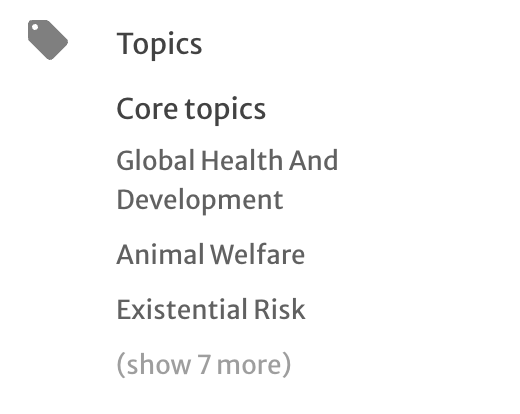
We might feature the core topics more in the future. We’ll also be trying to improve the content, images, and general structure/styles of the core topic pages in the near future to make them easier to use, better resources for people who want to learn more about the topics, etc. And we might extend some of the features listed here to all topic pages, not just the core topics.
How did we choose the list of “core topics”?
To choose “core topics,” we looked at clusters of popular tags and selected groupings that made sense given what we’re trying to do (in particular, let people keep up with content in specific sub-fields in EA, and explore those sub-fields deeper).
(We referred to an analysis from SEADS on tag clusters and looked at how other EA websites organize topics. We're really grateful to the folks at SEADS for doing this analysis!)
What we learned from working on subforums
We wanted to help users engage with the content that is most relevant and helpful to them, so we began piloting subforums last October. Over the last few months, we’ve tried a few different iterations of subforums and launched subforums on Effective Giving, Bioethics, Software Development, and Forecasting & Estimation. What we learned:
- Subforums were just not used very much; most things that were posted in subforums were also posted to the Frontpage, and internal-to-subforums discussions didn’t happen very much.
- We had hoped that people would start informal discussions in subforums more; we featured “start a discussion” (or “thread”) options, and we thought that the fact that fewer people would see the content (exclusively subforum members and people exploring the subforum) would encourage people to share thoughts that didn’t merit a full post, etc. This didn’t really happen. People were pretty confused about the feature, and we think it might also not have fit neatly into users’ mental models of what the Forum is for. We’ll be trying out different ways of working on this with the shortform feature (see below).
- Users seemed confused by the idea of joining a small subforum on a platform that’s already relatively small (we estimate the Forum has a little less than 10,000 monthly users, of whom around 1,000-3,000 comment or post).
Some things we think might have happened, although we’re not sure:
- We were just wrong about the need for subforums.
- We just haven’t made subforums good enough.
- Users didn’t have a recurring reminder or burning desire to visit subforums, so discussions in subforums would die out.
So we’re closing down the subforums pilot, although we might revisit something like subforums in the future.
Other changes
Notifying users by mentioning them
If you write “@” and then someone’s username, you can now notify that person. We might set up some barriers for this feature to avoid causing spam-like notifications. Please note that you can also customize your notification settings by going to account settings.
Tagging shortform posts
When you write a shortform post (for instance, by going to the Shortform page), you will now see tag options at the bottom of the post (called “Shortform topic”).
If you select one or more of these, the shortform will have the tag on it when others read it, and will appear on the related core topic page. I tagged an old shortform of mine with the “Career choice” topic as an example — you can see it at the bottom of the page here if you use the "posts collapsed" view.
You can also create a shortform post that’s specifically related to a core topic by going to the topic page (the posts tab — here’s an example) and clicking on “New Shortform.”
We’re hoping to develop the shortform feature more, as we think it might be useful for sharing ideas that don’t need a full post or less-polished writing.
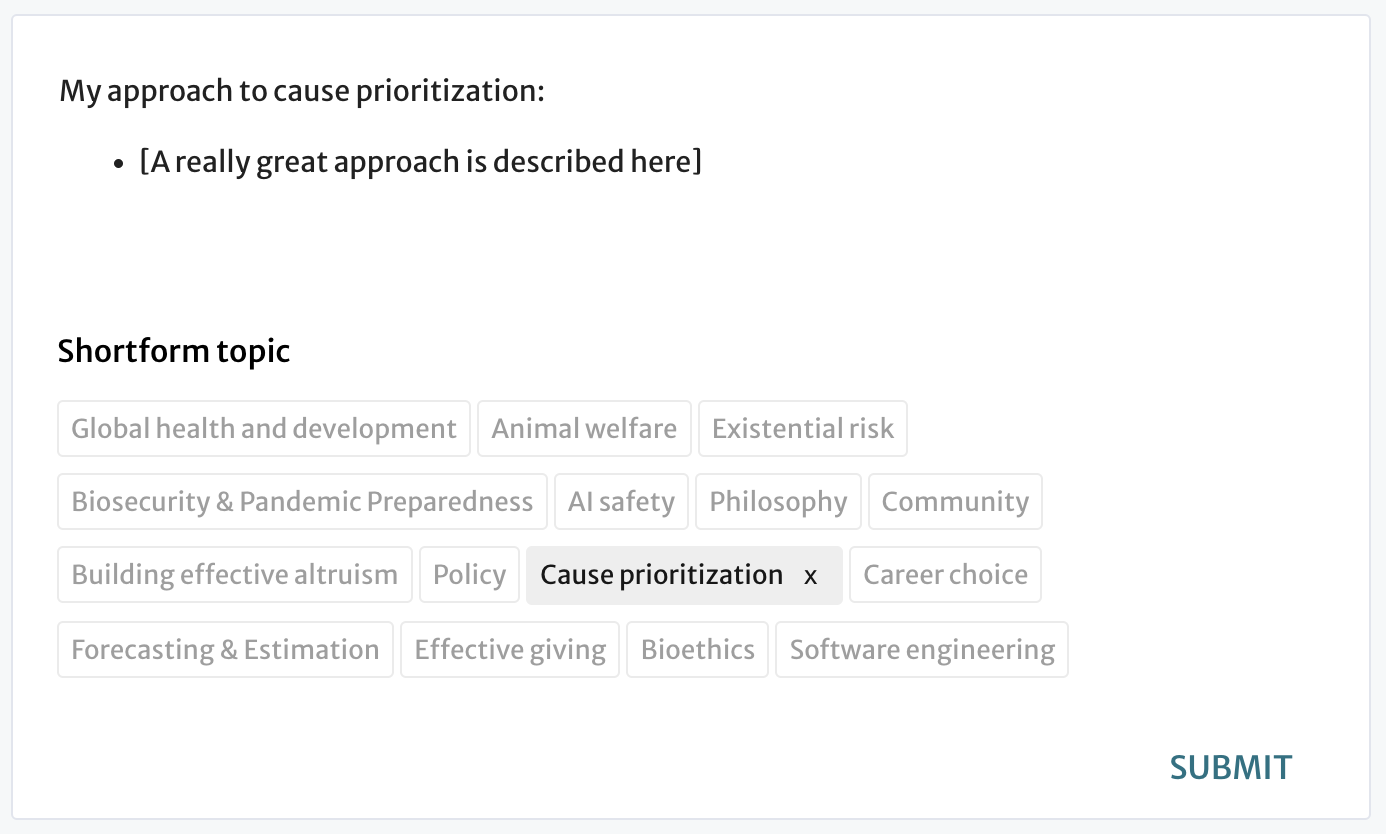
Uploading social previews
In the past, when you shared posts from the Forum on social media, the default preview mostly showed the light bulb logo or the first image in a post. You can now upload an image specifically for the social preview, and the featured text will be the first lines of the post.
This option is available on the draft page; when you’re editing a draft of a post, you’ll see the “Edit Link Preview” section near the bottom.
We added a custom preview image (quickly made!) to this post.
Coauthors can edit posts (fixing a bug)
Previously, only the first author of a post could edit it. All coauthors can now edit posts.
If you have any feedback, please share it!
You can comment on this post, or get in touch by emailing forum@centreforeffectivealtruism.org.
Thanks so much to the folks who worked on these projects, to everyone who helped with the pilot subforums, to those who gave input on the community-Frontpage test, and to many others.

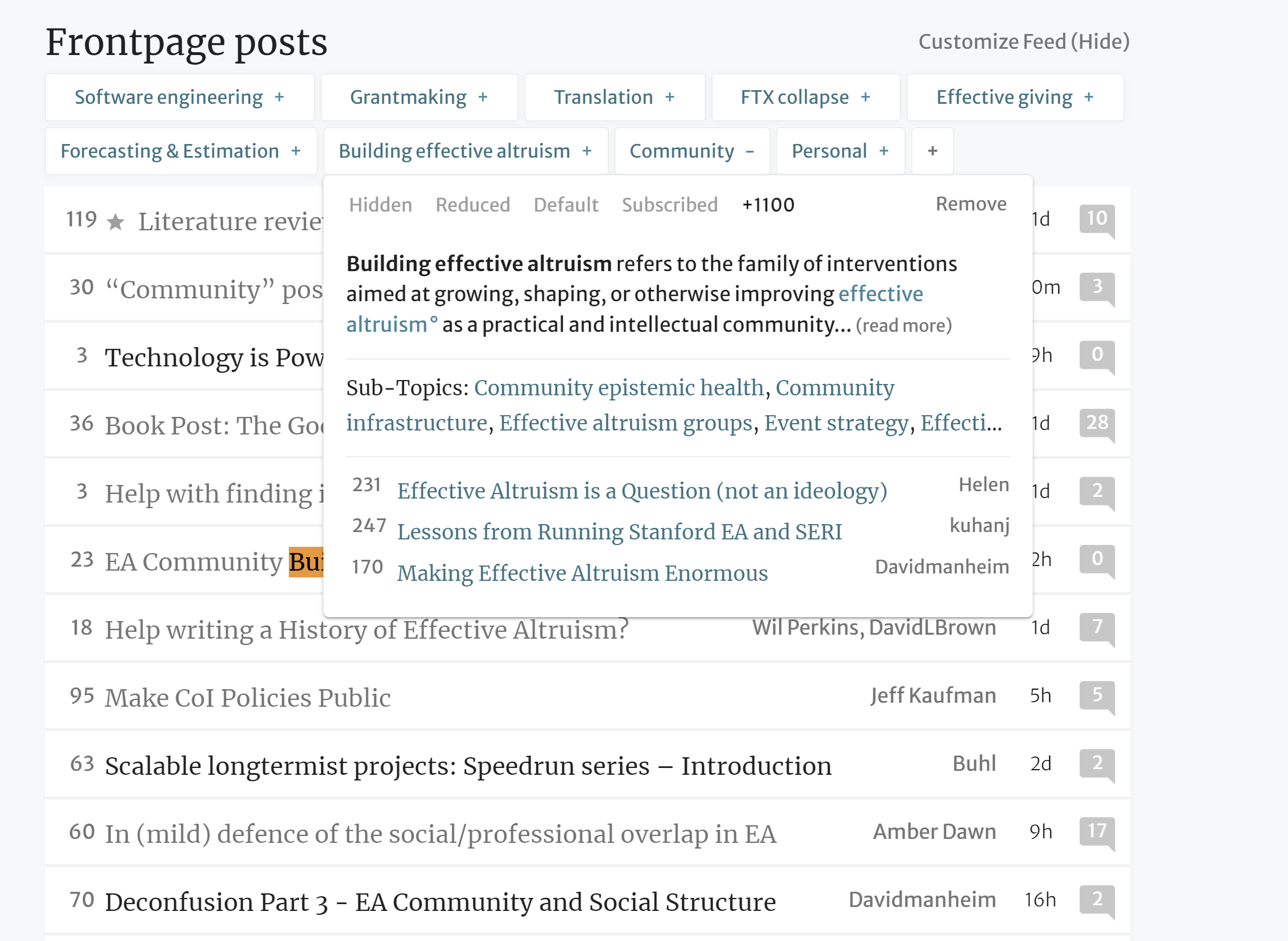
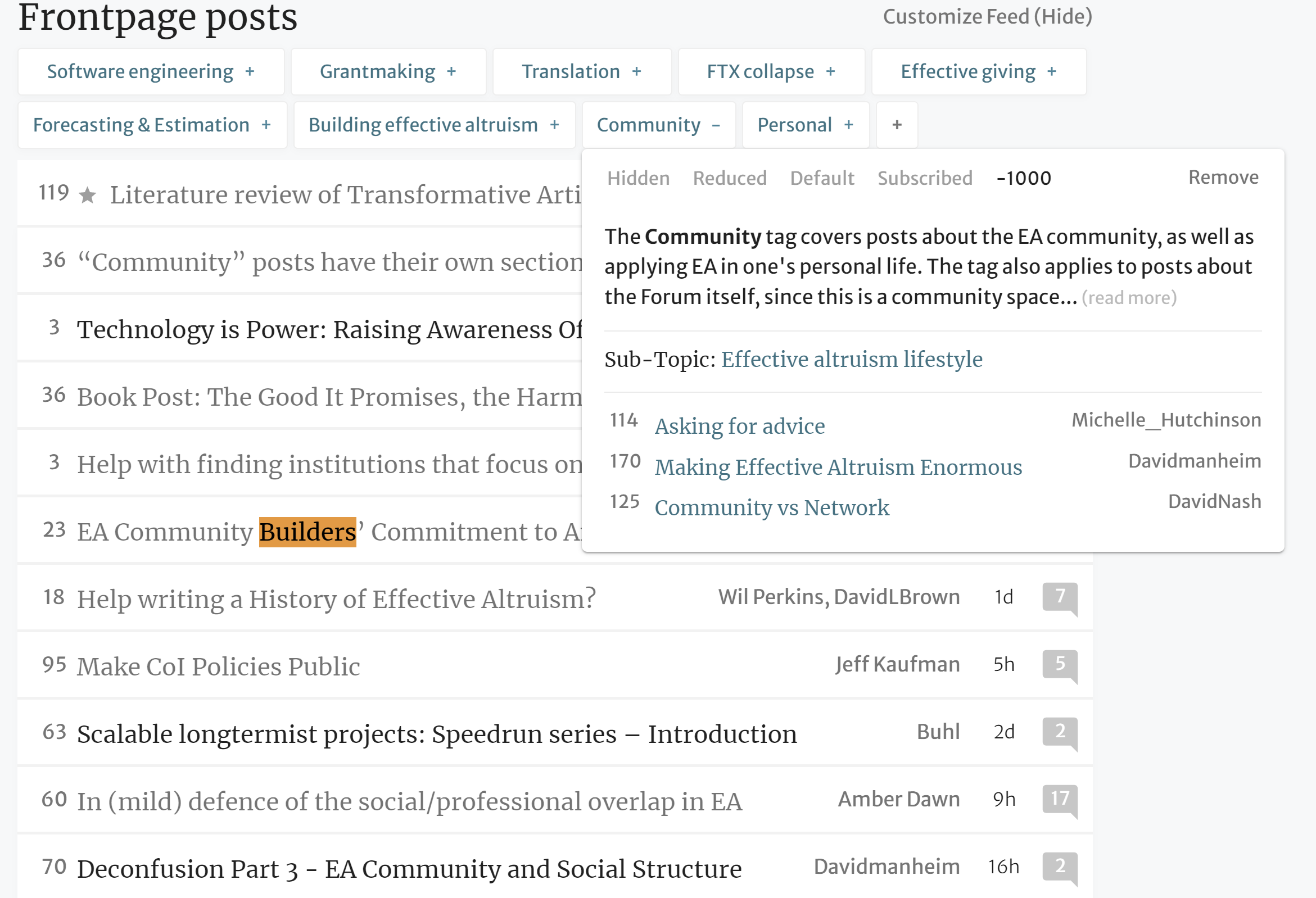
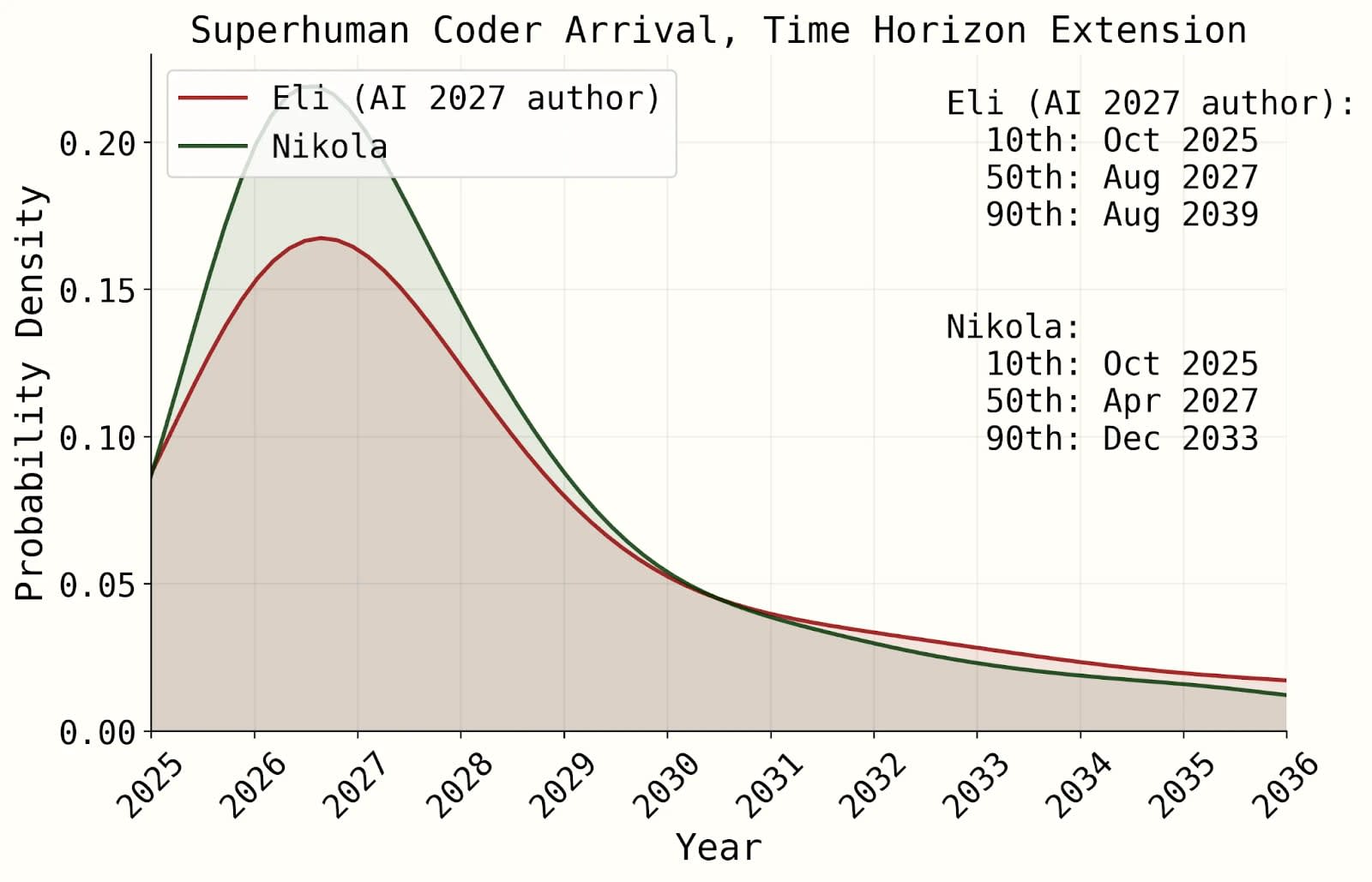
Is there any way I can remove the "community posts" section from my front page? I used to have the "community" tag blocked completely, so now I'm seeing a lot more community posts than I'd like.